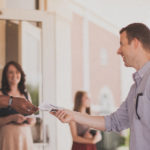WACO—Nearly nine of 10 Americans have relied upon healing prayer at some point in their lives, praying for others even more than for themselves, according to a study by a Baylor University epidemiologist.
“The most surprising finding is that more than a quarter of all Americans have practiced laying on of hands—and nearly one in five has done so on multiple occasions,” said Jeff Levin, university professor of epidemiology and population health.
“Outside of belief in God, there may be no more ubiquitous religious expression in the U.S. than use of healing prayer,” said Levin, director of the program on religion and population health at Baylor’s Institute for Studies of Religion.
The findings also suggest prayer may be among the most widely used forms of treatment for medical problems, rather than a “fringe activity” as many people might believe, he said.
The study is published in the Journal of Religion and Health. Findings are based on analyses of data from the third round of the Baylor Religion Survey, a nationally representative population survey conducted in partnership with the Gallup Organization in 2010.
Prayers for healing
More than three-fourths of Americans have prayed for their own healing, and nearly a third do so often, Levin said. Nearly 90 percent have prayed for the healing of others, and more than half report doing so often. More than half of Americans have asked for healing prayer and have taken part in prayer groups.
“Interestingly, most people who use prayer for healing do so alongside regular medical care, rather than as a substitution, as has been presumed up to now,” Levin said. “Healing prayer is being used more as a complementary treatment rather than as an alternative one.”
The practice of laying on of hands is found in the Bible and long has been used by Christians and Jews not only as a symbol of blessing, but also to transmit physical healing, Levin said.
Sign up for our weekly edition and get all our headlines in your inbox on Thursdays
“For many of us, the image that might come to mind is the faith healer. But these findings show that the practice is much more widespread, as is healing prayer in general,” he said.
Statistical analysis of the survey of 1,714 U.S. adults showed:
- 78.8 percent of participants have prayed for healing for themselves at some point in their lives, and 32.4 percent do so often.
- 87.4 percent have prayed for healing for others, and 51.1 percent do so often.
- 54.1 percent have asked for prayers for their health.
- 26.1 percent have given a “laying on of hands” for healing.
- 53 percent have participated in a prayer group, prayer circle or prayer chain.
While certain factors, such as frequent religious attendance, reading Scripture or meditation, were predictive of at least one form of healing prayer, the single most consistent predictor was a loving relationship with God, the study found.
“People who feel a close connection to God, who love God and feel loved by God, are the very people most likely to pray for healing: for themselves or others, alone or in a group, and verbally or through laying on of hands,” Levin said. “These people are taking to heart the biblical call to ‘love your neighbor as yourself,’ something found in both the Old and New Testaments.”
Whether the prayers work is beyond the scope of his research, Levin said.
“So much has been written in the medical literature in the past several years about the possibility that prayer heals,” he said. “There have even been a series of controversial and inconclusive clinical trials.
“But with so much attention paid to the efficacy of prayer—something science may not ever be capable of proving one way or another to everyone’s satisfaction—almost no attention has been given to simply documenting the practice. How many people pray for healing? How often? Who are these folks? That’s why this study was done.”
The next step will be to investigate whether there are differences in rates of healing prayer across religions and denominations, Levin said. But “preliminary analysis suggests that the practice is widespread, regardless of one’s religious background or beliefs,” he noted.














We seek to connect God’s story and God’s people around the world. To learn more about God’s story, click here.
Send comments and feedback to Eric Black, our editor. For comments to be published, please specify “letter to the editor.” Maximum length for publication is 300 words.